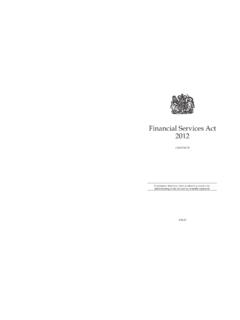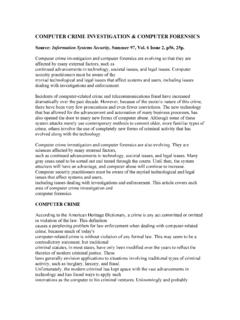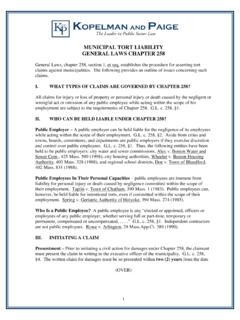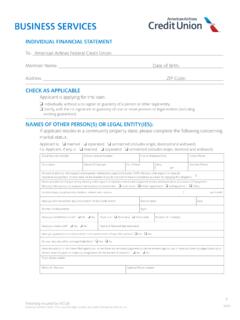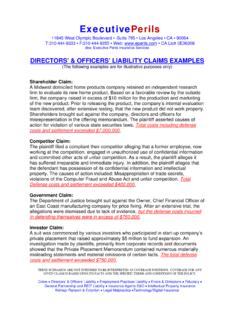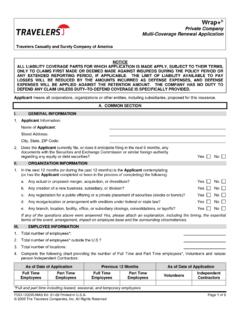Transcription of STATE LIABILITY ACT 20 OF 1957 - Justice Home
1 STATE LIABILITY ACT 20 OF 1957 (Afrikaans text signed by the Governor-General) as amended by Legal Succession to the South African Transport Services Act 9 of 1989 Constitution Consequential Amendments Act 201 of 1993 STATE LIABILITY Amendment Act 14 of 2011 ACT To consolidate the law relating to the LIABILITY of the STATE in respect of acts of its servants. 1 Claims against the STATE cognizable in any competent court Any claim against the STATE which would, if that claim had arisen against a person, be the ground of an action in any competent court, shall be cognizable by such court, whether the claim arises out of any contract lawfully entered into on behalf of the STATE or out of any wrong committed by any servant of the STATE acting in his capacity and within the scope of his authority as such servant.
2 2 Proceedings to be taken against executive authority of department concerned (1) In any action or other proceedings instituted by virtue of the provisions of section 1, the executive authority of the department concerned must be cited as nominal defendant or respondent. (2) The plaintiff or applicant, as the case may be, or his or her legal representative must, within seven days after a summons or notice instituting proceedings and in which the executive authority of a department is cited as nominal defendant or respondent has been issued, serve a copy of that summons or notice on the STATE Attorney.
3 [S. 2 amended by s. 1 of Act 201 of 1993 and substituted by s. 1 of Act 14 of 2011 .] 3 Satisfaction of final court orders sounding in money (1) Subject to subsections (4) to (8), no execution, attachment or like process for the satisfaction of a final court order sounding in money may be issued against the defendant or respondent in any action or legal proceedings against the STATE or against any property of the STATE , but the amount, if any, which may be required to satisfy any final court order given or made against the nominal defendant or respondent in any such action or proceedings must be paid as contemplated in this section.
4 (2) The STATE Attorney or attorney of record appearing on behalf of the department concerned, as the case may be, must, within seven days after a court order sounding in money against a department becomes final, in writing, inform the executive authority and accounting officer of that department and the relevant treasury of the final court order. (3) (a) A final court order against a department for the payment of money must be satisfied- (i) within 30 days of the date of the order becoming final; or (ii) within the time period agreed upon by the judgment creditor and the accounting officer of the department concerned.
5 (b) (i) The accounting officer of the department concerned must make payment in terms of such order within the time period specified in paragraph (a) (i) or (ii). [ASSENTED TO 26 MARCH 1957] [DATE OF COMMENCEMENT: 5 APRIL 1957] Page 1 of 6 STATE LIABILITY ACT 20 OF 19574/4/2012http://juta/ (ii) Such payment must be charged against the appropriated budget of the department concerned. (4) If a final court order against a department for the payment of money is not satisfied within 30 days of the date of the order becoming final as provided for in subsection (3) (a) (i) or the time period agreed upon as provided for in subsection (3) (a) (ii), the judgement creditor may serve the court order in terms of the applicable Rules of Court on the executive authority and accounting officer of the department concerned, the STATE Attorney or attorney of record appearing on behalf of the department concerned and the relevant treasury.
6 (5) The relevant treasury must, within 14 days of service of the final court order as provided for in subsection (4), ensure that- (a) the judgment debt is satisfied; or (b) acceptable arrangements have been made with the judgment creditor for the satisfaction of the judgment debt, should there be inadequate funds available in the vote of the department concerned. (6) If the relevant treasury fails to ensure that- (a) the judgment debt is satisfied; or (b) acceptable arrangements have been made with the judgment creditor for the satisfaction of the judgment debt, should there be inadequate funds available in the vote of the department concerned, within the time period specified in subsection (5)
7 , the registrar or clerk of the court concerned, as the case may be, must, upon the written request of the judgement creditor or his or her legal representative, issue a writ of execution or a warrant of execution in terms of the applicable Rules of Court against movable property owned by the STATE and used by the department concerned. (7) (a) Subject to paragraph (b), the sheriff of the court concerned must, pursuant to the writ of execution or the warrant of execution, as the case may be, attach, but not remove, movable property owned by the STATE and used by the department concerned.
8 (b) The sheriff and the accounting officer of the department concerned, or an official of his or her department designated in writing by him or her, may, in writing, agree on the movable property owned by the STATE and used by the department concerned that may not be attached, removed and sold in execution of the judgment debt because it will severely disrupt service delivery, threaten life or put the security of the public at risk. (c) If no agreement referred to in paragraph (b) is reached, the sheriff may attach any movable property owned by the STATE and used by the department concerned, the proceeds of the sale of which, in his or her opinion, will be sufficient to satisfy the judgment debt against the department concerned.
9 (8) In the absence of any application contemplated in subsection (10), the sheriff of the court concerned may, after the expiration of 30 days from the date of attachment, remove and sell the attached movable property in execution of the judgment debt. (9) Subject to this Act, the Rules of Court, where applicable, apply to the issuing of a writ of execution or a warrant of execution, as the case may be, and the attachment, removal and sale of movable property in execution of a judgment debt against the STATE . (10) (a) A party having a direct and material interest may, before the attached movable property is sold in execution of the judgment debt, apply to the court which granted the order, for a stay on grounds that the execution of the attached movable property- (i) would severely disrupt service delivery, threaten life or put the security of the public at risk; or (ii) is not in the interests of Justice .
10 (b) If an application referred to in paragraph (a) is brought by the department concerned, the application must contain a list of movable property and the location Page 2 of 6 STATE LIABILITY ACT 20 OF 19574/4/2012http://juta/ , compiled by the department concerned, that may be attached and sold in execution of the judgment debt. (c) Notice of an application in terms of paragraph (a) must be given to the judgment creditor and sheriff concerned. (11) In order to comply with its obligations in terms of subsection (5), and in general to ensure that final court orders are satisfied by departments without any delay, the relevant treasury may- (a) make or issue appropriate regulations, instructions, circulars, guidelines and reporting rules; (b) issue a direction to a department to make a payment in order to satisfy any outstanding final court order; (c) conduct an investigation, inspection or review into any failure by a department to pay any outstanding final court orders.










